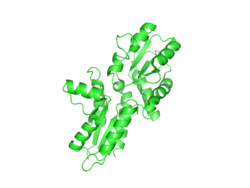Biology:Cobalt chelatase
| cobalt chelatase | |||||||||
|---|---|---|---|---|---|---|---|---|---|
 Putative cobalt chelatase monomer from Desulvobrio vulgaris.[1] | |||||||||
| Identifiers | |||||||||
| EC number | 6.6.1.2 | ||||||||
| CAS number | 81295-49-0 | ||||||||
| Databases | |||||||||
| IntEnz | IntEnz view | ||||||||
| BRENDA | BRENDA entry | ||||||||
| ExPASy | NiceZyme view | ||||||||
| KEGG | KEGG entry | ||||||||
| MetaCyc | metabolic pathway | ||||||||
| PRIAM | profile | ||||||||
| PDB structures | RCSB PDB PDBe PDBsum | ||||||||
| Gene Ontology | AmiGO / QuickGO | ||||||||
| |||||||||
| Cobalt chelatase, CobT subunit | |||||||||
|---|---|---|---|---|---|---|---|---|---|
| Identifiers | |||||||||
| Symbol | CobT | ||||||||
| Pfam | PF06213 | ||||||||
| InterPro | IPR006538 | ||||||||
| |||||||||
Cobalt chelatase (EC 6.6.1.2) is an enzyme that catalyzes the chemical reaction
- ATP + hydrogenobyrinic acid a,c-diamide + Co2+ + H2O [math]\displaystyle{ \rightleftharpoons }[/math] ADP + phosphate + cob(II)yrinic acid a,c-diamide + H+
The four substrates of this enzyme are ATP, hydrogenobyrinic acid a,c-diamide, Co2+, and H2O; its four products are ADP, phosphate, cob(II)yrinic acid a,c-diamide, and H+.
The aerobic cobalt chelatase (aerobic cobalamin biosynthesis pathway)[2][3] consists of three subunits, CobT, CobN (InterPro: IPR003672) and CobS (InterPro: IPR006537).
The macrocycle of vitamin B12 can be complexed with metal via the ATP-dependent reactions in the aerobic pathway (e.g., in Pseudomonas denitrificans) or via ATP-independent reactions of sirohydrochlorin in the anaerobic pathway (e.g., in Salmonella typhimurium).[4][5] The corresponding cobalt chelatases are not homologous. However, aerobic cobalt chelatase subunits CobN and CobS are homologous to Mg-chelatase subunits BchH and BchI, respectively.[5] CobT, too, has been found to be remotely related to the third subunit of Mg-chelatase, BchD (involved in bacteriochlorophyll synthesis, e.g., in Rhodobacter capsulatus).[5]
This enzyme belongs to the family of ligases, specifically those forming nitrogen-D-metal bonds in coordination complexes. The systematic name of this enzyme class is hydrogenobyrinic-acid-a,c-diamide:cobalt cobalt-ligase (ADP-forming). Other names in common use include hydrogenobyrinic acid a,c-diamide cobaltochelatase, CobNST, and CobNCobST. This enzyme is part of the biosynthetic pathway to cobalamin (vitamin B12) in aerobic bacteria.
See also
References
- ↑ Romão, Célia V.; Ladakis, Dimitrios; Lobo, Susana A. L.; Carrondo, Maria A.; Brindley, Amanda A.; Deery, Evelyne; Matias, Pedro M.; Pickersgill, Richard W. et al. (4 January 2011). "Evolution in a family of chelatases facilitated by the introduction of active site asymmetry and protein oligomerization". Proceedings of the National Academy of Sciences 108 (1): 97–102. doi:10.1073/pnas.1014298108. PMID 21173279.
- ↑ "Genetic and sequence analyses of a Pseudomonas denitrificans DNA fragment containing two cob genes". J. Bacteriol. 173 (19): 6058–6065. 1991. doi:10.1128/jb.173.19.6058-6065.1991. PMID 1917840.
- ↑ "Assay, purification, and characterization of cobaltochelatase, a unique complex enzyme catalyzing cobalt insertion in hydrogenobyrinic acid a,c-diamide during coenzyme B12 biosynthesis in Pseudomonas denitrificans". J. Bacteriol. 174 (22): 7445–7451. 1992. doi:10.1128/jb.174.22.7445-7451.1992. PMID 1429466.
- ↑ "Cobalamin (coenzyme B12): synthesis and biological significance". Annu. Rev. Microbiol. 50: 137–181. 1996. doi:10.1146/annurev.micro.50.1.137. PMID 8905078. http://pdfs.semanticscholar.org/d859/d9a7b8f4dcebb41a5992232b36cf2f4351d5.pdf.
- ↑ 5.0 5.1 5.2 "Interplay between an AAA module and an integrin I domain may regulate the function of magnesium chelatase". J. Mol. Biol. 311 (1): 111–122. 2001. doi:10.1006/jmbi.2001.4834. PMID 11469861.
Further reading
- "Assay, purification, and characterization of cobaltochelatase, a unique complex enzyme catalyzing cobalt insertion in hydrogenobyrinic acid a,c-diamide during coenzyme B12 biosynthesis in Pseudomonas denitrificans". J. Bacteriol. 174 (22): 7445–51. 1992. doi:10.1128/JB.174.22.7445-7451.1992. PMID 1429466.
- "The biosynthesis of adenosylcobalamin (vitamin B12)". Nat. Prod. Rep. 19 (4): 390–412. 2002. doi:10.1039/b108967f. PMID 12195810.
 |

